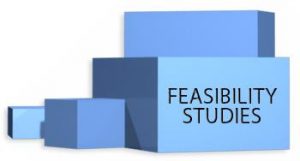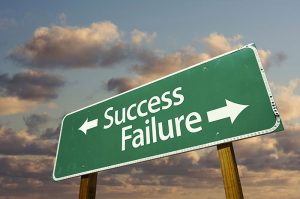Campaign Planning Study, Campaign Readiness Study or Campaign Feasibility Study, no matter what you call it, this study is one of the most important parts to a successful capital campaign. The study enables the organization to set an achievable monetary goal for the campaign, leverage internal support for fundraising, and cultivate a prospective donor base in the surrounding community. A Feasibility Study is designed to produce a comprehensive understanding of the opinions and attitudes of the organization’s representatives who will be called on to provide leadership and other resources for its vision to become a reality.
Imagine yourself chairman of the board of a high-tech company. Your board is convened and the question for discussion is, “Shall we expand operations to produce more computer products?”
The major issue is whether the market can absorb the proposed increased productivity and increase the company’s profit. There are many opinions, but someone suggests that the firm conduct a marketing feasibility study. The proposed study will involve many areas of company operation. The marketing divisions will be especially important in the study. One thing is sure, the expansion of the plant will involve more than machines, contractors, architects, and workers. A key question is whether new customers can be identified and whether the present customers will buy even more or new computer products issuing from the company’s new capacity. A feasibility study will provide the basis for the board of directors and management in making the decision.
Much of the above is similar to what a non-profit organization deals with when thinking about raising funds for special programs, buildings, equipment, endowment or new programs. A feasibility study is needed for the same reasons. In the case of a non-profit, a major issue is the capacity of the market, i.e., prospects (alumni, parents, grateful patients, friends, community leaders, philanthropist, corporations, and foundations) to consider or increase giving to support the proposed project or increased endowment.
 Feasibility studies involve an inside and outside aspect. The inside phase covers a broad review of the development office structure, the recent history of giving, the kinds of giving programs that have been utilized and their success, the gift-processing procedures, the condition and thoroughness of the prospect files, the effective use of the computer, experience with volunteers, research capacity, quality of the professional support staff, communications (both external and internal) and related matters.
Feasibility studies involve an inside and outside aspect. The inside phase covers a broad review of the development office structure, the recent history of giving, the kinds of giving programs that have been utilized and their success, the gift-processing procedures, the condition and thoroughness of the prospect files, the effective use of the computer, experience with volunteers, research capacity, quality of the professional support staff, communications (both external and internal) and related matters.
The external aspect of the feasibility study involves interviews with key prospects and leaders of the non-profit’s constituency. Many board members are included in the list of those to be interviewed, but not all. Since the cost of the study, in part, reflects the number of those interviewed, the selection should be made carefully. And foremost at issue is the financial capacity of those to be seen.
The number of those to be visited generally ranges between forty and one hundred depending on the goal, competition and the geographic location of the organization. These individuals, if they are properly selected, are able to provide the basic information required to make the decisions relative to the proposed program and the capital campaign to support it.
WHAT IS THE BASIC PURPOSE OF A PLANNING STUDY?
- To determine just what can be accomplished in fundraising.
- To market merits and contributions to those being interviewed.
- To develop a campaign plan for that will be workable in consideration of the findings.
- To protect against a negative campaign experience.
WHO IS INVOLVED?
- The leaders and past donors.
- Those who benefit from programs.
- Those who could make a contribution financial or otherwise — to the future.
- The influential opinion makers.
HOW MANY PEOPLE SHOULD BE INTERVIEWED?
A minimum of 40 – we prefer closer to 60 or more if in a large metropolitan area, a large goal (over $10 million), and lots of local competition.
We also would study the possibility of group meetings, mail surveys, and phone contacts.
HOW ARE INTERVIEWEES PREPARED?
A letter is sent to them asking for an interview, which is direct, specific in its request for specific amount of time, clear in what it hopes to achieve, unequivocal in pointing out that the purpose is not solicitation, descriptive in announcing who is conducting the study, and emphasizes the confidentiality of the interview.
A preliminary case statement is sent which is brief, contains minimum statistics, and is an informational piece about the project and is not a sales presentation.
WHAT DOES THE STUDY TEST AND HOW DOES IT FUNCTION?
Section 1: Tests and probes the interviewee’s familiarity with your organization.
Section 2: Tests and probes the interviewee’s knowledge of, perception of, and involvement in, your public relations activities.
Section 3: Probes the interviewee’s perception of your fund raising activities, his/her interest in supporting your organization financially, and his/her willingness to act as an advocate on your behalf.
Section 4: Seeks advice from the interviewee in regard to prospects, goals, timing, leadership, and strategies for the campaign.
WHAT SHOULD THE FINAL REPORT INCLUDE?
Section 1: Replays the opinions, perceptions and attitudes of those interviewed, with no editorializing. Actual quotes are used throughout this section and the entire report.
Section 2: Evaluates those perceptions based on objective experiences with other similar non-profits and situations.
Section 3: Recommends how to proceed in terms of:
(a) How to move ahead and Goal.
(b) Plan of Action.
(c) Timetable.
Section 4: Outlines budget for professional and operational costs.
WHO DOES THE FEASIBILITY STUDY?
An assessment of the feasibility of a campaign can be conducted by the organization itself or by outside professional counsel. If the organization is very well prepared it should be capable of making an internal assessment of feasibility. However, if a full-blown feasibility study is needed, then that study is best conducted by outside counsel having no ties to the organization.
Organizations lacking the resources and the know-how described above are not in a position to evaluate the feasibility of a capital or endowment campaign. Perhaps the principal value of having outside counsel perform a campaign feasibility study is the opportunity to obtain candid answers to tough questions. A consultant is not part of the organization’s “family”, and that means the responses from study subjects will be more candid and complete.
CONCLUSION
The Campaign Planning & Feasibility Study’s importance cannot be overstated, the study looks at all elements that are key to successful fundraising, beginning with the case for support and concluding with realistic recommendations and a campaign operational plan.
Based on the findings, the feasibility study recommends procedures that will lead to the most generous possible results, at the earliest possible moment, at the lowest possible cost. In addition to the information gathered in the process of the feasibility study interviews, the interviews themselves provide an invaluable opportunity to subtly “sell” your institution’s needs to prospective major donors.
Indeed, if no information were needed at all, the Study’s value to your program would be well served by this function alone. Because no gift is yet being sought, the study interview usually provides the last opportunity to discuss your organizations needs with prospective major donors without the tension that necessarily exists during an actual solicitation. The study is educating your prospective donors.
The Huddleston Group believes so strongly in the importance of the Campaign Planning Study that each Study is assigned to a principal of our firm who is responsible for the majority of the interviews performed.
I hope you found this article helpful and if we can be of any assistance please do not hesitate to contact us. If there is a subject matter you would like us to discuss in an up-coming newsletter please drop us a not to ron@thehuddlestongroup.com
Good Luck
Ron Huddleston, FAHP, CFRE
President
The Huddleston Group

